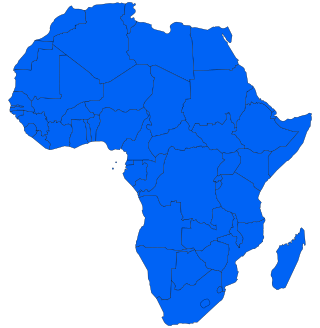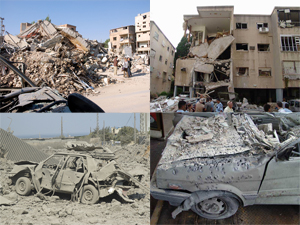
Kofi Atta Annan was a Ghanaian diplomat who served as the seventh secretary-general of the United Nations from 1997 to 2006. Annan and the UN were the co-recipients of the 2001 Nobel Peace Prize. He was the founder and chairman of the Kofi Annan Foundation, as well as chairman of The Elders, an international organisation founded by Nelson Mandela.

United Nations Security Council Resolution 1706, adopted on August 31, 2006, after recalling previous resolutions on the situation in Sudan, including resolutions 1556 (2004), 1564 (2005), 1574 (2004), 1590 (2004), 1591 (2005), 1593 (2004), 1663 (2006), 1665 (2006) and 1679 (2006), the Council expanded the mandate of the United Nations Mission in the Sudan (UNMIS) to include deployments in Darfur to enforce the Darfur Peace Agreement.

United Nations Security Council resolution 1097, adopted unanimously on 18 February 1997, after expressing concern over the situation in the African Great Lakes region and for the safety of refugees and displaced persons, the Council endorsed a five-point peace plan to address the situation in eastern Zaire.

United Nations Security Council resolution 1150, adopted unanimously on 30 January 1998, after reaffirming all resolutions on Georgia, particularly Resolution 1124 (1997), the Council extended the mandate of the United Nations Observer Mission in Georgia (UNOMIG) until 31 July 1998.
United Nations Security Council resolution 1181, adopted unanimously on 13 July 1998, after recalling all previous resolutions on the situation in Sierra Leone, the council established the United Nations Observer Mission in Sierra Leone (UNOMSIL) to monitor the military and security situation in the country for an initial period of six months until 13 January 1999.

The United Nations Security Council resolution 1196 was adopted unanimously on 16 September 1998, after recalling Resolution 1170 (1998) on Africa; the Council discussed the importance of strengthening the effectiveness of arms embargoes in place in several countries across the continent.

United Nations Security Council resolution 1197, adopted unanimously on 18 September 1998, after reaffirming its primary responsibility to maintain international peace and security, the Council addressed co-operation efforts with the Organisation of African Unity (OAU).

United Nations Security Council resolution 1208, adopted unanimously on 19 November 1998, after recalling Resolution 1170 (1998) on Africa, the Council discussed the treatment and status of refugees on the continent.

United Nations Security Council resolution 1209, adopted unanimously on 19 November 1998, after recalling resolutions 1170 (1998) and 1196 (1998) on Africa, the Council addressed illicit arms flows on the continent.

United Nations Security Council resolution 1226, adopted unanimously on 29 January 1999, after reaffirming Resolution 1177 (1998) on the situation between Eritrea and Ethiopia, the Council strongly urged Eritrea to accept an agreement proposed by the Organisation of African Unity (OAU) to resolve the conflict between the two countries.

United Nations Security Council resolution 1231, adopted unanimously on 11 March 1999, after recalling resolutions 1181 (1998) and 1220 (1999) on the situation in Sierra Leone, the Council extended the mandate of the United Nations Observer Mission in Sierra Leone (UNOMSIL) until 13 June 1999.

United Nations Security Council resolution 1258, adopted unanimously on 6 August 1999, after reaffirming Resolution 1234 (1999) on situation in the Democratic Republic of the Congo, the Council authorised the deployment of military liaison personnel to the capitals of the signatories of the Lusaka Ceasefire Agreement.

United Nations Security Council resolution 1260 was adopted unanimously on 20 August 1999; after recalling resolutions 1171 (1998), 1181 (1998) and 1231 (1999) on the situation in Sierra Leone, the Council strengthened the United Nations Observer Mission in Sierra Leone (UNOMSIL) by up to 210 additional military observers.

United Nations Security Council resolution 1265, adopted unanimously on 17 September 1999, in the first resolution to address the topic, the council discussed the protection of civilians during armed conflict.

United Nations Security Council resolution 1279, adopted unanimously on 30 November 1999, after recalling resolutions 1234 (1999), 1258 (1999) and 1273 (1999) on situation in the Democratic Republic of the Congo, the council established the United Nations Mission in the Democratic Republic of Congo (MONUC) for an initial period until 1 March 2000.

United Nations Security Council resolution 1297 was adopted unanimously on 12 May 2000, after reaffirming resolutions 1177 (1998), 1226 (1999) and 1227 (1999) on the situation between Eritrea and Ethiopia. The Council demanded an immediate end to hostilities between the two countries.
United Nations Security Council resolution 1312, adopted unanimously on 31 July 2000, after reaffirming resolutions 1298 (1999) on the situation between Eritrea and Ethiopia, and 1308 (2000), the council established the United Nations Mission in Ethiopia and Eritrea (UNMEE) in anticipation of a peacekeeping operation subject to future authorisation.

United Nations Security Council resolution 1320, adopted unanimously on 15 September 2000, after reaffirming resolutions 1298 (1999), 1308 (2000) and 1312 (2000) on the situation between Eritrea and Ethiopia, and 1308 (2000), the Council deployed a military component as part of the United Nations Mission in Ethiopia and Eritrea (UNMEE) and extended its mandate until 15 March 2001.

United Nations Security Council resolution 1327, adopted unanimously on 13 November 2000, after recalling Resolution 1318 (2000) adopted at the Millennium Summit and receiving the Report of the Panel on United Nations Peacekeeping, the Council adopted a resolution concerning the improvement of its peacekeeping operations.

United Nations Security Council resolution 1366, adopted unanimously on 30 August 2001, after reaffirming resolutions 1196 (1998), 1197 (1998), 1208 (1998), 1265 (1999), 1296 (1999), 1318 (2000), 1325 (2000) and 1327 (2000) concerning aspects of armed conflict, the Council reiterated its aim to prevent armed conflict as part of its responsibility to maintain international peace and security.


















